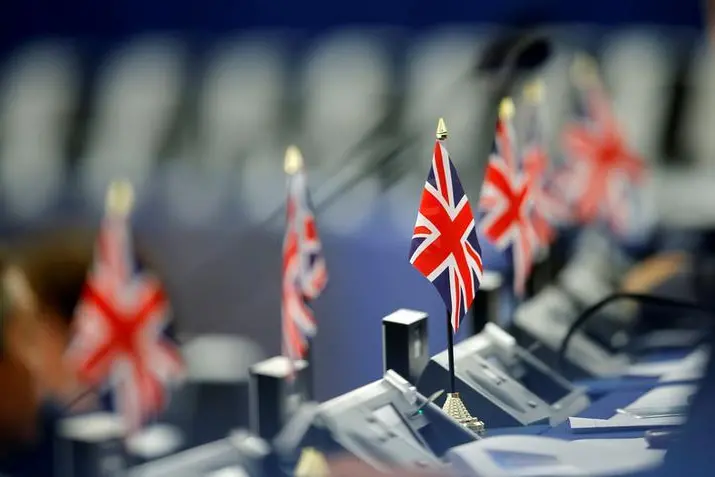PHOTO
Spare a thought for the UK’s relatively new Foreign Secretary Elizabeth Truss, known universally as Liz. Appointed by Prime Minister Boris Johnson less than six months ago, never have the burdens the British constitution places on its senior diplomat seemed so onerous.
She is a member of the elected House of Commons, in order to answer to Parliament for the actions of the government, and carries a full constituency load like any other MP. At present, with the UK government in turmoil over the future of the prime minister, the distractions attached to being an MP are greater than ever, not least because, from recent polling, the foreign secretary also happens to be one of the two favorite candidates among Conservative Party members to be elected leader and prime minister should Johnson fall. Truss would not be human if this was not taking up some of her time. There is plenty of evidence that a campaign to promote her is well underway and that she is seeing many MPs to discuss their concerns for the future. These might not all be related to “Global Britain.”
Added to these complications are her current responsibilities, by statute and policy or by immediacy. Following Minister for European Negotiations Lord Frost’s resignation from Cabinet, the foreign secretary herself has been given the role of chief negotiator. The talks with Europe are at a tense stage, particularly with France and in relation to the rules governing market access to Northern Ireland, with its complicated relationship to the Republic of Ireland and the single market, focusing on where a border between them all might lie, in which the US also takes a keen interest.
If these domestic matters were not taking up enough of her time, there are the immediate threats surrounding Ukraine, with which the UK has taken a tough supporting stance; the development of the wider boundaries of foreign policy to the Indo-Pacific in terms of trade deals and the AUKUS security framework; and finally the responsibilities for international aid and development, which she also carries after her government abolished the self-standing Department for International Development and rolled it into the Foreign, Commonwealth and Development Department. It is some job.
I suspect, for these reasons, it is hard for the Middle East to attract the attention it deserves. The Gulf is an exception, as seen by the successful Gulf Cooperation Council-UK summit in December, with long-standing relationships, security and the UK’s all-important drive for a free trade agreement ensuring the region remains a key partner for London. I could not ask the foreign secretary to diminish her focus on any of her current pressures, but I do urge her to make full use of now-experienced MENA Minister James Cleverly and her outstanding diplomats in the region to make sure that the Middle East does not get neglected or simply become a flyover region on the way to Australia and India.
There is much for the UK to do in a restless region that is already wondering about the future engagement of other powers. London is playing a key role in the Iran nuclear deal talks in Vienna, where its opposition to the US abandonment of the deal in 2018 seems increasingly prescient. And the conflict in Yemen has been picking up pace and UN Envoy Hans Grundberg recently gave a worrying assessment to the Security Council, even before last week’s fatal Houthi attack on UNSC partner the UAE. The UK government should be accelerating its efforts through the UN on both the diplomatic and humanitarian fronts, notwithstanding the difficulties, before the conflict grows even more intractable, threatening to kill off whatever efforts at regional rapprochement are being made.
The UK’s support for the Abraham Accords as a possible way forward between Israel and its Arab neighbors is hard-headed and practical, but it must be aware of the threats to progress from the increase in Israeli settler violence, the confrontations and clearances in East Jerusalem and the hardening of Israeli activists’ political attitudes. Together with the paralysis in Palestinian politics in Gaza and Ramallah, the chances of the issues “shrinking” are remote, while crossing fingers is not a policy.
And as for Afghanistan — where some 97 percent of the population is at risk of sinking into poverty, while some 9 million are at risk of hunger, according to International Rescue — the UK could demand even more loudly and urgently the support of the international community. The world’s aid withdrawal damages not the Taliban, but the people of Afghanistan, large numbers of whom stood shoulder to shoulder with international partners, leaving them at risk and feeling abandoned.
The sooner the domestic crisis in the UK ends the better, wherever it leaves Truss. Then, without distractions, she can use her considerable abilities to ensure that any present misconception of the importance of the Middle East to the UK can be swiftly overturned.
- Alistair Burt is a former UK Member of Parliament who has twice held ministerial positions in the Foreign and Commonwealth Office — as Parliamentary Under Secretary of State from 2010 to 2013 and as Minister of State for the Middle East from 2017 to 2019. Twitter: @AlistairBurtUK
Copyright: Arab News © 2022 All rights reserved. Provided by SyndiGate Media Inc. (Syndigate.info).





















